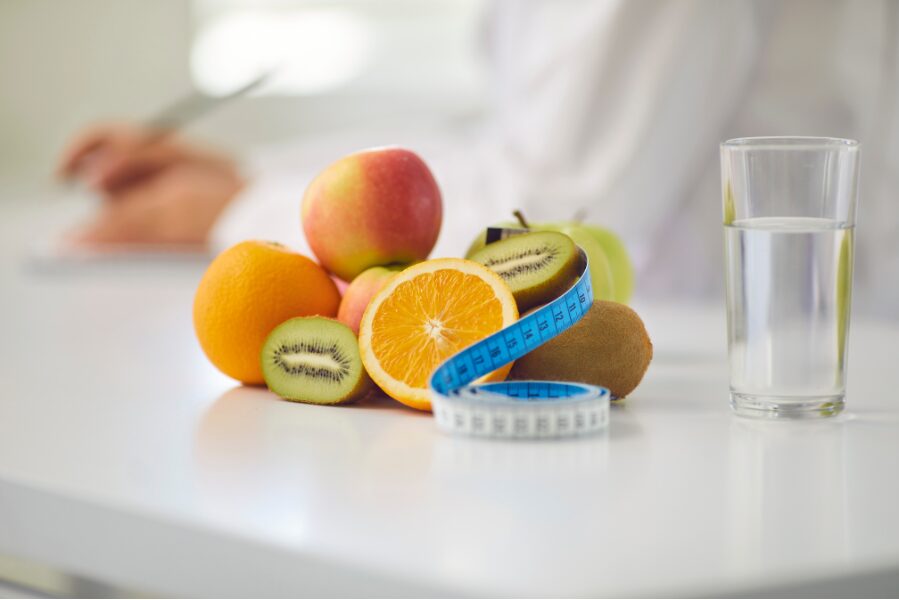When it comes to weight loss, there’s no one-size-fits-all solution – but the foods you choose can make a real difference. Certain ingredients don’t just fill you up; they can also support your metabolism, help regulate your appetite and give your body the fuel it needs to feel its best.
In this guide, we’ll look at some of the most effective foods for weight loss, from lean protein sources and high-fibre options to MCT-rich ingredients and slow-release carbs. Whether you’re planning to make small daily swaps or totally overhaul your weekly shop, these choices can help you stay fuller for longer and support your weight loss goals in a healthy way.
High-protein foods for weight loss
If you walk down any supermarket aisle or peruse social media – you’re bound to spot a display or advert for the latest high protein product. From bars and shakes to traditional protein sources, it seems to be all the rage.
There are lots of food that are high in protein, including:
- Steak
- Salmon
- Chicken
- Tuna
- Beans
- Tofu
How does protein help with weight loss?
Protein plays a key role in weight management. It takes longer to digest than carbs, which means it keeps you feeling full for longer. This can help to reduce the urge to snack and curb cravings between meals.
It also supports muscle growth and maintenance, which is important when you’re losing weight – especially if you’re also increasing how much you exercise. And not only that, a higher protein intake can even give your metabolism a small boost too, helping your body burn slightly more energy during digestion.
Steak for weight loss
Red meat often gets a bad rap, as eating too much of it can be linked to heart disease and certain cancers. But when eaten in moderation as part of a balanced diet it can help support muscle repair while making you feel fuller for longer. Lean cuts of steak – like sirloin or fillet – can be a great source of high-quality protein, iron and B vitamins. And if you trim any excess fat you can also keep the calorie content lower while still getting that protein punch.
Is salmon good for weight loss?
Salmon is rich in protein and omega-3 fatty acids which can support heart health and help regulate appetite. Thanks to it also packing plenty of healthy fats, salmon contributes to a feeling of fullness, making it easier to avoid snacking between meals. Grilled, baked or air-fried salmon can be an easy and satisfying addition to your weekly meal plan.
Chicken for weight loss
Skinless chicken breast is one of the leanest animal proteins you can choose. It’s low in fat, high in protein and incredibly versatile, making it ideal as a snack or as part of a main meal. Whether you like it grilled, shredded or oven-roasted, chicken keeps you feeling full without adding too many calories to your diet.
Is tuna good for weight loss?
Tuna is low in fat, high in protein and contains helpful nutrients like vitamin D, iron and selenium. Whether you buy it fresh or canned in spring water it’s a convenient option for lunches, snacks or quick dinners. Just watch out for tinned tuna packed in oil as it can add unnecessary calories.
How do beans help with weight loss?
Protein isn’t just about how much meat you can eat. Beans – like black beans, chickpeas, or kidney beans – are a plant-based source of both protein and fibre. That extra fibre helps slow digestion, keeping your appetite in check while supporting steady blood sugar levels. They’re also naturally low in fat and packed with nutrients, making them a great addition to soups or salads.
Does tofu reduce fat?
Tofu is a popular plant-based protein that’s low in calories and rich in amino acids, iron and calcium. It contains compounds called isoflavones that may also have a mild effect on fat metabolism, although more research is needed. Thanks to its protein content and ability to absorb flavours, tofu can help you feel nicely satisfied after meals.
What are MCT foods?
MCT stands for medium-chain triglycerides – a type of fat that’s processed differently by the body compared to long-chain fats like olive oil. Rather than being stored, MCTs are quickly absorbed and converted into energy, which is why they’ve gained popularity in some diets.
While MCT oil is a concentrated form, certain everyday foods contain MCTs in smaller amounts too.
MCT foods for weight loss
Including moderate amounts of MCT-rich foods in your diet may help support weight loss by boosting energy while helping you feel full. Here are a few natural sources worth knowing:
Coconut oil
One of the best natural sources of MCTs like lauric acid. It adds flavour to your cooking and it may support energy levels in small amounts.
Palm kernel oil
Contains MCTs but is often used in processed foods. Best enjoyed occasionally due to both environmental and health concerns.
Dairy products
Butter, cheese and whole milk provide smaller amounts of MCTs and are best enjoyed in moderation.
Ghee
A clarified butter that’s naturally lactose-free. Great for cooking and adding depth to meals.
How to incorporate these foods and ingredients into your diet
You don’t need to overhaul your diet to benefit from MCT-rich foods. Here are a few simple ways to include them:
- Swap oils – Use small amounts of coconut oil or ghee when cooking or roasting meat and vegetables
- Add to smoothies – A teaspoon of coconut oil can add texture and richness to shakes or smoothies
- Use in coffee – Some people blend MCT oil or ghee into their morning coffee for a creamy texture and an extra energy boost
- Choose full-fat dairy – if you tolerate dairy, ppt for moderate portions of full-fat milk, yoghurt or cheese as these contain natural MCTs
As always, balance and variety are key. MCT foods can support your weight loss goals when included mindfully as part of a broader approach to healthy eating, but tend to be high in calories too.
Fibre foods for weight loss
Fibre is a key nutrient when it comes to managing weight. It slows digestion, helps you feel fuller for longer and supports healthy blood sugar levels. Many fibre-rich foods are also low in calories and packed with essential vitamins, making it a win-win.
Here are a few options to include in your diet:
Berries
Low in calories but high in fibre and antioxidants. A handful of raspberries or blackberries can make for a satisfying snack or addition to a smoothie.
Apples
A good source of soluble fibre – great for curbing hunger between meals.
Carrots
High in fibre and great to eat raw or cooked, carrots are also filling and low in calories.
Broccoli
Rich in fibre and nutrients like vitamin C. Broccoli’s great steamed, roasted or added to stir-fries and salads.
Chickpeas
Packed with both fibre and plant-based protein, chickpeas are a great way to bulk up salads or soups, and when blitzed, they make a delicious and healthy hummus.
How does fibre aid weight loss?
Fibre helps with weight loss in several ways. It slows the rate at which food is digested, helping you stay fuller for longer which can help to reduce the likelihood of overeating. It also supports steady blood sugar levels, which can help curb cravings and energy crashes. High-fibre foods often take longer to chew, making them naturally helpful for portion control.
Carbohydrates for weight loss
Carbs often get a bad name in weight loss conversations, but the right kinds of carbohydrates can actually be highly beneficial. Fibre-rich carbs provide long-lasting energy to help regulate appetite and keep you feeling satisfied.
Here are a few smart carb choices that can support your weight loss goals:
Grapes (and other fruits)
Naturally sweet and hydrating, grapes are low in calories and high in water content. Eaten in moderation, they can satisfy sugar cravings without derailing your goals.
Brown bread
A good source of complex carbs and fibre. Compared to white bread, it keeps you full for longer and supports steady energy release.
Baked potatoes
When eaten with the skin, baked potatoes offer fibre, potassium and lasting energy. Pair with lean protein or veg for a balanced meal.
Brown rice
Higher in fibre than white rice, it digests more slowly. A useful base for stir-fries, curries and salads.
Oats
Rich in beta-glucan, a type of soluble fibre that helps regulate hunger hormones. Oats are great for a filling breakfast that supports weight loss.
How do carbs aid weight loss?
Carbohydrates are your body’s main source of energy. Choosing complex carbs – like whole grains, oats, fruit and vegetables – helps maintain stable blood sugar levels, reducing spikes and crashes that can lead to cravings. These types of carbs are also high in fibre, which slows digestion and curbs cravings, making it easier to manage your appetite and reduce the overall calories you take in.








